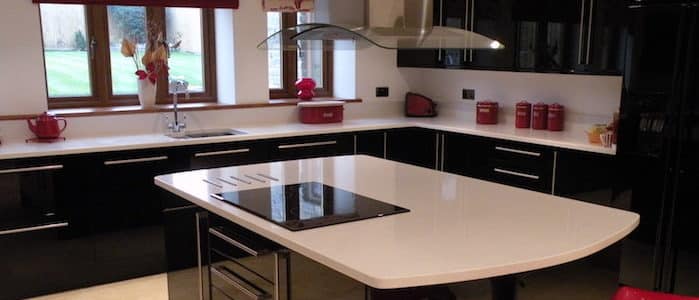When it comes to choosing a type of stone for your kitchen worktop, there’s no doubt that Quartz worktops are rising in popularity. It’s the ideal material for high-use areas and it’s certainly the most durable material on the market.
But with its seamless appearance and flexibility, could Corian be a worthy alternative?
QUARTZ:
Quartz has been the leading worktop material for years, and it’s well loved in the industry thanks to its unrivalled beauty and resilience.
The manufacturing of quartz countertops blends together approximately 93% natural quartz stone along with other granite and mirror chips for shine, as well as customisable pigments and resins to form a totally sealed and polished surface. Therefore, the stone has the strength and colour range that other materials often lack.
Benefits:
- Wider choice of colours in comparison to other natural stones – as aforementioned, the ability to customise quartz is a huge advantage. The range of colours available is unmatched.
- Extremely hardwearing and versatile – As one of the hardest materials on the earth, quartz is naturally robust.
- Resistant to staining – Quartz is non-porous, therefore, it is much less susceptible to staining, unlike granite or marble. Any spills can be wiped off with a damp cloth.
- Minimal maintenance – There is no need to apply any extra sealants or solutions, and it does not require any routine maintenance other than the occasional wipe-down with soap and water.
- Antibacterial properties – Quartz has anti-bacterial properties that make it perfect for safe food preparation.
Cons:
- Can fade and become discoloured – One of the risks of having a quartz worktop is that it can fade when exposed to a considerable amount of natural sunlight.
- Heavier than granite – Quartz is extremely heavy, and as a result, it needs professional installation. It is also vital that the frame is strong or it will not hold the worktops.
- Seams can be visible – Unlike Corian, the seams in quartz worktops can be visible. However, these seams can be hidden. In cases where seams are more apparent seams can be coloured, polished and coated to hide them. If seams are of concern, choosing dark quartz worktops or solid colour will naturally help reduce the visibility of joins and seams.
- Not heat resistant – Much like the other worktop materials, quartz is not completely heat resistant so an element of care is needed when hot pots and pans are involved.
CORIAN:
Corian is a man-made product composed of resin and filler. Acrylic resin is applied to the top of a substrate material, such as wood, to create seamless worktops that can be fitted and moulded into many contemporary designs.
Benefits:
- Man-made – As a manufactured product, Corian was designed with the sole purpose of being a sleek, modern and durable worktop.
- Seamless finish – Unlike natural stones, there’s no need to worry about any unsightly seams.
- Stain-resistant – Corian’s non-porous properties mean spills and stains are not an issue. A Corian worktop is very hygienic and can simply be wiped down with a damp cloth.
- Flexible – Corian’s versatility allows for the perfect amount of flexibility for easy installation and any shape or size of bespoke designs.
- Repairable – Chips and cracks can easily be repaired.
Cons:
- Expensive – Despite it being a man-made product, Corian can sometimes be more expensive than natural stone.
- Easily damaged by heat – While it can withstand certain levels of heat, Corian is more susceptible to heat damage than some natural stones, such as granite.
- Can look industrial – Due to being man-made, Corian does struggle to mimic the aesthetics of natural stone.
- Water damage – If water seeps through the exterior resin and onto the filler beneath, it can cause irreparable damage. In such cases, it’s very likely that the whole worktop will need to be replaced.
- Susceptible to scratching – Corian is much more at risk of scratching. Thankfully, most shallow scratches are easy to buff out. Preparing and cutting directly on the worktop can cause damage and potential bacterial risks.
- Risk of Further Damage – It is also important to take care of placing heavy objects on the worktop as Corian is also prone to denting.
Still unsure whether to choose Quartz or Corian?
Generally, Corian may be great in terms of flexibility of price and design, but when it comes to withstanding the test of time – Quartz cannot be beaten. True to its popularity, quartz really is the ideal material for kitchen and even bathroom worktops and vanity surfaces.
The most essential thing to keep in mind when deciding between materials is what you need. Having a checklist of requirements will help you differentiate between which worktops will work for your home and which worktops that are unsuitable.
If you have any questions about installing Quartz or Corian worktops into your kitchen, feel free to take a look at our guide to buying and installing kitchen worktops. Or give us a call on 0117 956 3030.
